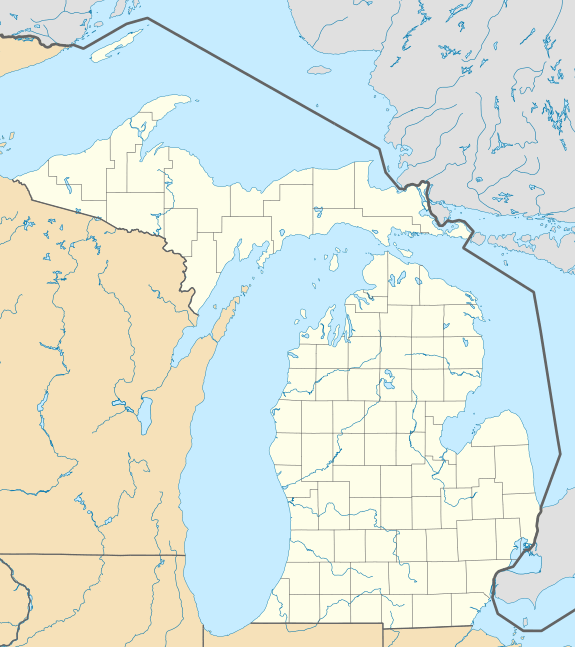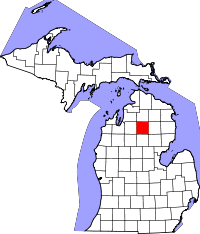Grayling Township, Michigan
| Grayling Township, Michigan | |
|---|---|
| Township | |
| Motto: "Where nature surrounds"[1] | |
 Grayling Township Location within the state of Michigan | |
| Coordinates: 44°40′40″N 84°38′33″W / 44.67778°N 84.64250°WCoordinates: 44°40′40″N 84°38′33″W / 44.67778°N 84.64250°W | |
| Country | United States |
| State | Michigan |
| County | Crawford |
| Area | |
| • Total | 174.7 sq mi (452.6 km2) |
| • Land | 170.7 sq mi (442.2 km2) |
| • Water | 4.0 sq mi (10.4 km2) |
| Elevation | 1,152 ft (351 m) |
| Population (2010) | |
| • Total | 5,827 |
| • Density | 34/sq mi (13.2/km2) |
| Time zone | Eastern (EST) (UTC-5) |
| • Summer (DST) | EDT (UTC-4) |
| ZIP codes | 49738-49739 |
| Area code(s) | 989 |
| FIPS code | 26-34660[2] |
| GNIS feature ID | 1626391[3] |
| Website |
twp |
Grayling Township is a charter township of Crawford County in the U.S. state of Michigan. The population was 5,827 as of the 2010 census,[4] down from 6,516 at the 2000 census.
The city of Grayling is surrounded by Grayling Township.
History
The township was named for the grayling fish that lived in the Au Sable River.[5]
Geography
Grayling Township occupies a large area in the center of Crawford County and extends west to the border with Kalkaska County. The city of Grayling is located southwest of the township center, along Interstate 75, which serves the township with five exits. Camp Grayling, the main training facility for the Michigan National Guard, occupies all of the township west of the city of Grayling.
According to the United States Census Bureau, the township has a total area of 174.7 square miles (452.6 km2), of which 170.7 square miles (442.2 km2) is land and 4.0 square miles (10.4 km2), or 2.29%, is water. The Au Sable River flows west to east across the center of the township, joined by its East Branch from the north, while Lake Margrethe is in the western part of the township, within Camp Grayling.
Demographics
As of the census[2] of 2000, there were 6,516 people, 2,420 households, and 1,802 families residing in the township. The population density was 38.1 per square mile (14.7/km²). There were 3,945 housing units at an average density of 23.1 per square mile (8.9/km²). The racial makeup of the township was 94.83% White, 3.04% African American, 0.48% Native American, 0.26% Asian, 0.08% from other races, and 1.32% from two or more races. Hispanic or Latino of any race were 0.80% of the population.
There were 2,420 households out of which 32.5% had children under the age of 18 living with them, 60.6% were married couples living together, 9.4% had a female householder with no husband present, and 25.5% were non-families. 20.7% of all households were made up of individuals and 8.5% had someone living alone who was 65 years of age or older. The average household size was 2.55 and the average family size was 2.91.
In the township the population was spread out with 25.5% under the age of 18, 6.6% from 18 to 24, 28.8% from 25 to 44, 25.2% from 45 to 64, and 14.0% who were 65 years of age or older. The median age was 39 years. For every 100 females there were 111.8 males. For every 100 females age 18 and over, there were 108.3 males.
The median income for a household in the township was $34,690, and the median income for a family was $37,963. Males had a median income of $30,973 versus $22,857 for females. The per capita income for the township was $17,355. About 9.1% of families and 11.7% of the population were below the poverty line, including 16.4% of those under age 18 and 4.4% of those age 65 or over.
References
- ↑ "Grayling Township, Michigan". Grayling Township, Michigan. Retrieved August 26, 2012.
- 1 2 "American FactFinder". United States Census Bureau. Retrieved 2008-01-31.
- ↑ U.S. Geological Survey Geographic Names Information System: Grayling Township, Michigan
- ↑ "Geographic Identifiers: 2010 Demographic Profile Data (G001): Grayling charter township, Crawford County, Michigan". U.S. Census Bureau, American Factfinder. Retrieved October 1, 2014.
- ↑ "Profile for Grayling, Michigan, MI". ePodunk. Retrieved August 26, 2012.
